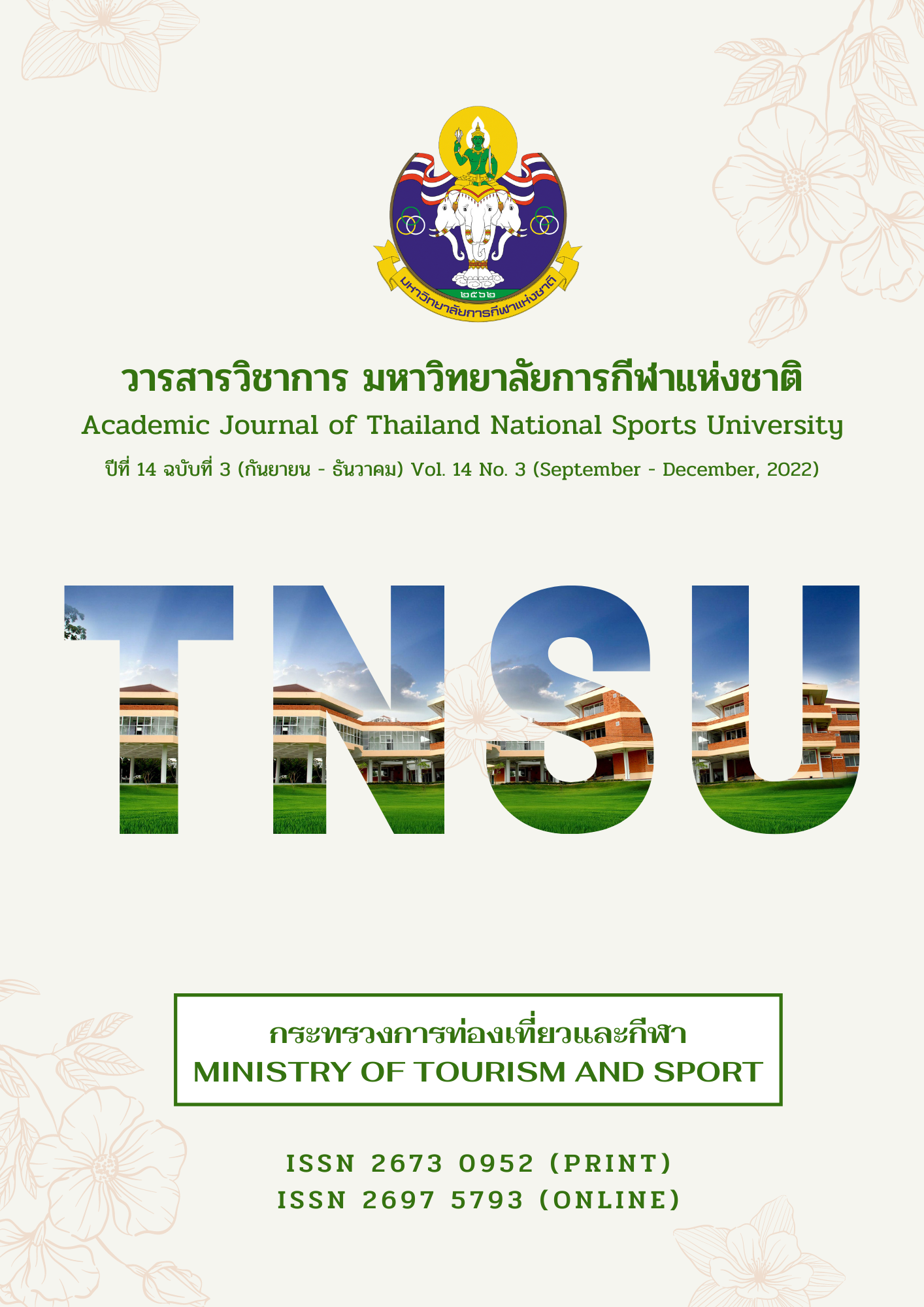ACTIVITY PROGRAM APPLYING INVITATIONAL EDUCATION APPROACH ON AWARENESS AND PRACTICES TO PREVENT PM 2.5 PRIMARY SCHOOL STUDENTS
Main Article Content
Abstract
Purposes: To study the effects of an activity program applying invitational education approach on the awareness and practices to prevent PM 2.5 in primary school students. Methods: The subjects consisted of 40 third grade students, divided equally into 2 groups, 20 students for the experimental group, and 20 students in the control group. The research instruments were the activity program applying invitational education approach on the awareness and practices to prevent PM 2.5 consisting of 5 activities that had the index of congruence scores between 0.92 - 0.96, the average mean of index of congruence was 0.95, and the awareness and practices assessment form with IOC 0.98 and 0.96, and reliabilities were 0.81 and 0.90. The research was conducted for 8 weeks, 2 days a week, 50 minutes per day. The data were analyzed by mean, standard deviation and t - test.
Results: The research findings were as follows:
- The mean scores of the awareness and practice to prevent PM 2.5 of the experimental group students who got the activity program applying invitational education approach after the experiment were significantly higher than that before at the .05 level.
2. The mean scores of the awareness and practice to prevent PM 2.5 of the experimental group students who got the activity program applying invitational education approach after the experiment were significantly higher than that of the control group at .05 level.
Article Details

This work is licensed under a Creative Commons Attribution-NonCommercial-NoDerivatives 4.0 International License.
The published article is a copyright of the Academic Journal of Thailand National Sports University. The passage appeared in each article in this academic journal is a perspective of each author which is not related to the journal. Each author is required to be responsible for all components of his/her own article. If there are any mistakes, each author must be responsible for those mistakes on his/her own.
References
Breckler, S. W. (1986). Attitude Structure and Function. Hillsdale. New Jersey: L. Erlbaum Association.
Chulalongkorn University. (2019). Learn to live with PM 2.5. Retrieved from https://www.chula.ac.th/wp-content/uploads/2019/10/Chula-PM25.pdf
Greenpeace. (2018). Annual Report 2018. Retrieved from https://storage.googleapis.com/ planet4-thailand-stateless/2019/01/adbd74ae-gp-sea-annual-report-2018.pdf
Jintana Sarayuthspitak. (2018). School Health Program. Bangkok: Printing Press of Chulalongkorn University.
Kanyopa, Theresia Joakim. (2018). Learners transitioning from township to ex-model c school: An invitational educational perspective. Retrieved from https://researchspace.ukzn. ac.za/handl/10413/17230
Kornkan Rasameesoraj, & Jintana Sarayuthpitak. (2018). Effects of practical learning process on nutrition toward analytical thinking and adequate food selection for seventh grade students. Journal of Education, 46(4), 1 - 19.
Ministry of Natural Resources and Environment. (2019). National Agenda Driving Action Plan "Solving Dust Pollution Problems". Retrieved from http://www.pcd.go.th/file/Plan_ for_solving_dust_pollution_problems.pdf
Ministry of Public Health. (2015). In case of small dust. Bangkok: Printing House of the Agricultural Cooperatives Association of Thailand.
Naruechon Mongkolsiri. (2017). Effects of using activity series by applying action learning approach on attitude and safe biking of senior primary school students (Master’s thesis), Chulalongkorn University.
Niramol Satawut. (2008). Invitational education: An educational innovation. Bangkok: Mittrapap Karnpim and Studio Company limited.
Prasopchai Pasunon. (2015). Validity of questionnaire for social science research. Journal of Social Sciences Srinakharinwirot University, 18(1), 375 - 396.
Rangsan Saengsook, Oranuch Limtasiri, Malinee Boonyaratapan, Niramon Satawut, & Arom Chanuanjitre, (2018) The effectiveness of the invitational concept implemented in schools. Veridian E-Journal, Silpakorn University, 11(1), 16 - 29.
Sarinya Rodpipat, Jintana Sarayuthpitak, & Sanong Ekgasit. (2020). Activities to create awareness of the dangers of cigarettes for elementary school students by using dirty lung kit: A pilot study. Journal of Phranakhon Rajabhat research journal, 15(1), 198 - 211.
Purkey, W. W. (1997). Self-Concept and School Achievement. New Jersey: Prentice- Hall.
Oranuch Limtasiri. (2006). Inviting school. Journal of Teacher, 3(32), 105 - 110
Simpson, D. (1972). Teaching physical educations: A system approach. Boston: Houghton Mufflin Co.
Valaya Alongkorn Rajabhat University. (2014). A Guide to Organizing a Student - Centered Teaching (2nd ed.). Pathumthani: Learning Center for Digital Publishing Production and Management.
World Health Organization. (2019). Ambient (outdoor) air pollution. Retrieved from https://www.who.int/news-room/fact-sheets/detail/ambient-(outdoor)-air-quality-and-health


